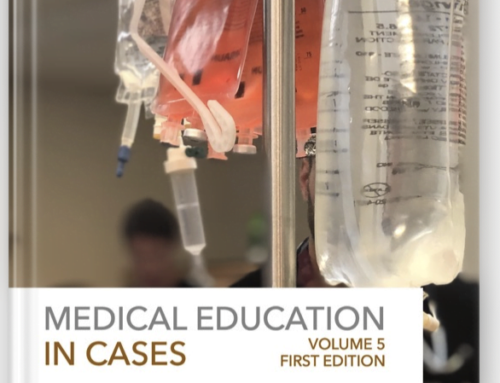 We had the remarkable pleasure of facilitating a MEdIC workshop at the Social Media and Critical Care (SMACC) conference in Chicago this past month. We shared our process with those who participated and spent time developing cases. We’d like to thank the participants from our workshop for their hard work! The below is one of the final products that our amazingly engaged and enthusiastic group come up with. The case generated meaningful discussion in our SMACC live session, and we hope that it will be as engaging in the online forum! We look forward to hearing what you think about our Case of the Unseasoned Senior.
We had the remarkable pleasure of facilitating a MEdIC workshop at the Social Media and Critical Care (SMACC) conference in Chicago this past month. We shared our process with those who participated and spent time developing cases. We’d like to thank the participants from our workshop for their hard work! The below is one of the final products that our amazingly engaged and enthusiastic group come up with. The case generated meaningful discussion in our SMACC live session, and we hope that it will be as engaging in the online forum! We look forward to hearing what you think about our Case of the Unseasoned Senior.
MEdIC Series: The Concept
Inspired by the Harvard Business Review Cases and initially led by Dr. Teresa Chan (@TChanMD) and Dr. Brent Thoma (@Brent_Thoma), the Medical Education In Cases (MEdIC) series puts difficult medical education cases under a microscope. On the fourth Friday of the month, we pose a challenging hypothetical dilemma, moderate a discussion on potential approaches, and recruit medical education experts to provide “Gold Standard” responses. Cases and responses are be made available for download in PDF format – feel free to use them! If you’re a medical educator with a pedagogical problem, we want to get you a MEdIC. Send us your most difficult dilemmas (guidelines) and help the rest of us bring our teaching to the next level.
The Case of the Unseasoned Senior (SMACC Edition)
by Rebecca Wood & Sarah Luckett-Gatopoulos
Mrs. Smith was a 50-year-old mother of three and had been admitted to hospital under the surgical service for the past 3 days. Debbie, a first-year resident, had been rounding on her every morning and was growing increasingly concerned with her clinical status..She had originally presented to hospital with diffuse abdominal pain, fever, and a high white count. The team had initially scheduled her to go to the operating theatre for a possible complicated diverticulitis. Since her admission, however, her management plan had been changed several times by the new Chief Surgical Resident, Sam Waltz.
This morning, Debbie had noticed that Mrs. Smith was somnolent, pale and running a high fever despite 3 days of intravenous antibiotics. Debbie knew she was growing increasingly ill, and was concerned that she might crash at any moment.
Sam seemed unsure of himself and had not created a definitive treatment plan for Mrs Smith. The usual half-hour morning rounds were now taking the team over two hours. Decisions were made and changed on a daily basis and the past few weeks seemed to become a ritual of constant interruptions, poor planning, and indecision. Debbie had voiced her concerns regarding Mrs. Smith to Sam but he had opted to watch and wait for one more day
As Debbie sat at the nursing station writing a progress report in Mrs. Smith’s chart, she was approached by Dave, a highly-reliable floor nurse.
“Debbie,” he began in a stern tone, “Mrs. Smith’s family would like to speak with you. They are really upset that nobody has explained what is going. Frankly, I’m not sure what the plan is either.’
At that moment, Dr. Singh, Debbie’s surgical attending, strode onto the ward.
“Dr. Singh!” Dave called, “Debbie and I were just discussing the plan for Mrs. Smith. She’s not responding to the antibiotics. Someone needs to make a decision.”
Dr. Singh looked at Debbie, surprised.
“Mrs. Smith has been under our care for three days,” he said. “No one told me she wasn’t improving. Why don’t we have a plan for her yet?”
Debbie hesitated. She knew that the new Chief Surgical Resident was sinking, not swimming, and she knew patient care was suffering as a result. But should she really throw him under the bus?
Key Questions
The SMACC MEdIC workshop participants would like to pose these questions to the readership:
- What is Debbie’s responsibility as a junior, off-service resident in this situation? Is there a way to ensure good patient care without sacrificing the relationship with her senior?
- Imagine you are Dr. Singh. How would you deal with the faltering Chief Resident?
- What is Dave’s role in dealing with the struggling senior? As a nurse, is there a role he can play in the Chief Resident’s education and ensuring adequate patient care? Who should he speak to and how?
Weekly Wrap Up
As always, we posted the expert responses and a curated commentary derived from the community responses one week after the case was published. This time the two experts are:
- Brent Thoma, MD, FRCPC from the University of Saskatchewan
- Jacky Parker, MB, BS, MHSc, CCFP(EM) from the University of Ottawa
On August 7, 2015 we will post the Expert Responses and Curated Community Commentary for the Case of the Unseasoned Senior. After that date, you may continue to comment below, but your commentary will no longer be integrated into the curated commentary. That said, we’d love to hear from you, so please comment below!
All characters in this case are fictitious. Any resemblance to real persons, living or dead, is purely coincidental. Also, as always, we will generate a curated community commentary based on your participation below and on Twitter. We will try to attribute names, but if you choose to comment anonymously, you will be referred to as your pseudonym in our writing.




